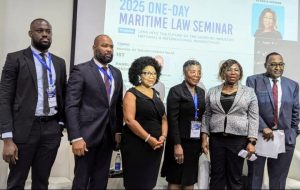

By Our Correspondent, Lagos.

Maritime law experts have called on the Federal Government to domesticate the Rotterdam Rules to enhance the global competitiveness of Nigerian importers and strengthen the country’s maritime legal framework.
They made the appeal on Thursday during the 2025 One-Day Maritime Law Seminar organised by the Nigerian Maritime Law Association (NMLA) in Lagos. The seminar was themed “Lens into the Future of the Shipping Industry: National and International Perspectives.”
Speaking at the event, Mrs. Mfon Usoro, President of the Chartered Institute of Logistics and Transport (CILT), emphasised the importance of adopting the Rotterdam Rules, noting that doing so would place Nigerian importers on stronger footing in international trade.
“The Rotterdam Rules is an international treaty that modernises the legal regime for maritime transport and the carriage of goods by sea,” she said. “It outlines the legal relationship between carriers and cargo owners and aims to reflect contemporary shipping practices.”
Usoro, a seasoned maritime lawyer and former Director-General of the Nigerian Maritime Administration and Safety Agency (NIMASA), noted that while countries such as Spain, Sweden, Switzerland, and Togo have ratified the treaty, Nigeria has yet to do so—partly due to concerns that the rules may favour carriers over cargo owners.
She acknowledged the potential advantages of ratification but advised a cautious approach given Nigeria’s current maritime infrastructure and investment climate.
“A careful evaluation is crucial to determine whether ratification aligns with Nigeria’s strategic and economic interests,” she said. “We need the political will and the resources to follow through with implementation, and perhaps wait for broader international adoption before making a final commitment.”
Usoro suggested that, in the interim, Nigeria could selectively incorporate relevant provisions of the Rotterdam Rules into its existing Carriage of Goods by Sea Act, particularly to address inconsistencies caused by overlapping laws.
She also recommended that the NMLA engage with the Comité Maritime International (CMI)’s Standing Committee on the Rotterdam Rules to negotiate provisions that may not suit Nigeria’s maritime objectives.
Further stressing the importance of domestic policy, Usoro highlighted the Cabotage Act as a crucial foundation for developing Nigeria’s maritime capacity. She argued that with proper enforcement, the Act could serve as a springboard for Nigerian shipping companies to expand into international markets.
Also speaking at the seminar, Mr. Hassan Bello, a maritime lawyer and former Executive Secretary of the Nigerian Shippers’ Council (NSC), discussed the topic “Revival of the Rotterdam Rules.” He advocated for African nations to adopt a unified legal framework to facilitate intra-African trade and attract investment.
“Europe has harmonised its shipping laws. African nations, on the other hand, remain divided, and this disunity undermines our investment potential,” Bello said. “A unified legal system would create uniformity, boost investor confidence, and enhance regional trade.”
Dr. Emeka Akabogu, another maritime lawyer, spoke on liability issues in international cargo transport. He noted that Nigeria’s current Carriage of Goods by Sea Act primarily governs cross-border transactions, but lacks clarity on jurisdiction in multi-stop shipping routes.
“For instance, if cargo is shipped from China to Nigeria via several countries, determining liability in the event of damage or delay becomes complex,” he said.
Akabogu explained that carriers have historically drafted contracts to limit their liability, often disadvantaging cargo owners. He noted that the Hague-Visby Rules—adopted by Nigeria in 2024—were designed to address such imbalances by establishing predictable liability standards.
Another panelist, Ms. Chisa Uba, observed that Nigeria’s reluctance to ratify the Rotterdam Rules stems from infrastructure gaps and uncertainties around implementation. She also pointed out that many developed nations, including the United States, have not ratified the treaty due to the broader liability it places on carriers.
“Developed shipping nations are wary of the Rotterdam Rules’ expanded liability framework,” Uba said. “This hesitancy underscores the need for Nigeria to carefully assess the implications before ratification.”
In her welcome address, NMLA President Mrs. Funke Agbor described the seminar as part of the association’s mission to highlight pressing legal issues in the maritime industry. She noted that the NMLA is the Nigerian chapter of the Comité Maritime International (CMI), which has long championed the Rotterdam Rules.
“One of CMI’s goals is to promote the ratification of these Rules, and we believe it’s essential to bring this dialogue to the wider maritime community,” Agbor said.
She praised the commitment of NMLA members and the broader maritime sector, especially in light of the federal government’s recent creation of the Ministry of Marine and Blue Economy—a move she described as a promising step for the industry’s future.
Edited by Dada Ahmed.


